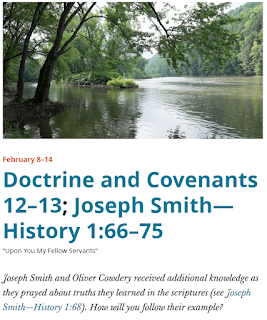One way to bring forth Zion is to talk about it and live its principles. That's why I have the "how to Zion" blog, here:
https://howtozion.blogspot.com/
_____
The phrase "cause of Zion" appears only four times in the scriptures, all in the D&C.
D&C 6:6, directed to Oliver Cowdery.
D&C 11:6, directed to Hyrum Smith.
D&C 12:6, directed to Joseph Knight Sr.
D&C 21:7, describing Joseph Smith "For thus saith the Lord God: Him have I inspired to move the cause of Zion in mighty power for good, and his diligence I know, and his prayers I have heard."
We can ask, what is the "cause of Zion" in this context?
The phrase "cause of Zion" suggests the cause of the Restoration. D&C 6, 11 and 12 were given before the Book of Mormon was completely translated. D&C 21 was given on April 6, 1830, in connection with the organization of the Church.
Earlier Christian writers had used the phrase. For example, the phrase "cause of Zion" appears three times in a sermon given by Samuel West, the pastor of the church in Dartmouth, the largest town near Joseph's early home in Vermont. The sermon was published in Boston in 1778, and presumably people in the area of Dartmouth would have been familiar with it.
After quoting Isaiah 66:9, West wrote, "i. e. As I have so wonderfully brought forth a people to maintain the cause of Zion against her enemies, can you think that I will stay my hand, and not continue to raise up persons to defend her, till her deliverance is compleated [sic]....
I will now close this Appendix, by asking whether the 66 th chap. of Isaiah, may not be illustrated by compairing it with the 4 th chapter of Micah, the first five verses of which are evidently a prophecy of the glorious state of the Church of Christ in the latter days, in the 6 th verse it is added, in that day i. e. at the time when God shall be about to establish the glorious state of the church..."*
In this sense, Christians everywhere can view Oliver, Hyrum, Joseph Knight, and Joseph Smith as among those persons raised up to defend Zion.
_____
A barn across the road from the Joseph Knight home was the site of the original Colesville branch. Hyrum Smith presided there for five months beginning in October 1830.
Finally, the words of John the Baptist leave us with an enticing question. What does he mean when he says the priesthood will not be taken from the earth until the sons of Levi offer an offering in righteousness? We immediately think of Aaronic Priesthood offerings in John’s time, which would have involved animal sacrifices. We wonder, will the Aaronic Priesthood eventually be taken from the earth? If animal sacrifice ended with the shedding of the Savior’s blood which it symbolized, what will the offering be?
In the Bible, the sons of Levi included Moses and his brother, Aaron. D&C 84:31 and 34 tell us that the modern sons of Levi are those who hold the Melchizedek and Aaronic Priesthoods. What is the offering they will offer? Joseph Smith answers this question in D&C 128:24,
… [A]nd he shall purify the sons of Levi, and purge them as gold and silver, that they may offer unto the Lord an offering in righteousness. Let us, therefore, as a church and a people, and as Latter-day Saints, offer unto the Lord an offering in righteousness; and let us present in his holy temple, when it is finished, a book containing the records of our dead, which shall be worthy of all acceptation.
The vast genealogical work of the Church, under the direction of the Priesthood, is the book containing the records of our dead, to be presented to the Lord as an offering when He returns. If this work was not underway when He returns, the earth would be smitten with a curse (See Malachi 4:6). This work will continue throughout the Millennium, thus the work of the Aaronic Priesthood will continue right up until the end of the thousand years, when its mission will be fulfilled as a preparatory priesthood and a schoolmaster to bring us to Christ (D&C 84:26,Galatians 3:24).
79, [1] p. ; 20 cm. (4 to)
Printed, by Draper and Folsom, at their printing-office, at the corner of Winter-Street.,
Boston: :
M,DCC,LXXVIII. [1778]








No comments:
Post a Comment